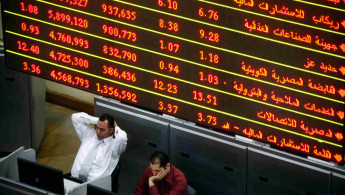Egypt's stock exchange sees three-day plunge after eruption of 'Palacegate' protests
The Cairo stock market opened for the week on Sunday morning but suspended trading for 30 minutes that day after bourse data showed the EGX 100 index level drop by 5 percent.
It was the first such suspension since 2016, when Egypt devalued its currency and launched austerity measures under an International Monetary Fund (IMF) programme.
Those austerity measures have plunged millions more Egyptians into poverty, with official data saying at least a third of the population lives under the poverty line.
Unofficial estimates claim as many as 60 percent of Egyptians could be living in stark poverty.
Those tough economic circumstances combined with a series of viral allegations of endemic corruption in Sisi's regime sparked the protests on Friday and Saturday which analysts say led to the sharp drop in share prices.
The decline continued on Monday and Tuesday, when the EGX 100 dropped by a further 3 percent by closing time.
Tuesday also witnessed a more than 4 percent decline in the EGX 30, which monitors the 30 most active companies in Egypt's market, as well as the suspension of trading in almost 60 stocks.
It also witnessed market capitalisation losses of more than $1 billion.
Ashraf Akhnoukh, director at Arqaam Capital in Cairo, told Reuters on Sunday that the "small escalation" in dissent had made investors cautious, causing a rush by Arab and local investors to sell shares.
Ahmed El-Maabady, head of the technical and financial analysis unit at Ideal Ratings, told Ahram Online that both the EGX 30 and EGX 100 had already been on a downward trend over the past six months.
"The recent calls for demonstrations in Egypt have also cast a shadow over the EGX performance and contributed to the decision by the bourse chairman to suspend the trading session on Sunday, and it may be cancelled if the EGX 100 drops 10 percent or more," he said.
Protests sweep Egypt
Unprecedented demonstrations calling for the ousting of Sisi erupted last week in Cairo, Suez and other Egyptian cities.
The protests were sparked by corruption allegations lodged against Sisi, his wife and the military by a former government contracter, now self-exiled in Spain.
Mohamed Ali has accused Sisi and his military of appropriating millions of dollars in public funds to build a colossal presidential palace and a number of luxurious villas.
At least 964 people have been detained since Friday in what has been dubbed the "Palacegate" revolution, according to the Egyptian Center for Economic and Social Rights.
Among the sentenced was award-winning human rights lawyer Mahinour El-Massry, who was arrested on Sunday after attending an investigation of several of those arrested during the demonstrations.
As the Egyptian president prepared to speak at the United Nations General Assembly in New York on Tuesday afternoon, #NotMyPresident and #SisiLies ranked as top trends on Twitter in Egypt.





 Follow the Middle East's top stories in English at The New Arab on Google News
Follow the Middle East's top stories in English at The New Arab on Google News
![Israeli forces ordered bombed Gaza's Jabalia, ordering residents to leave [Getty]](/sites/default/files/styles/image_330x185/public/2176418030.jpeg?h=a5f2f23a&itok=_YGZaP1z)

